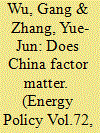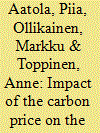|
|
|
Sort Order |
|
|
|
Items / Page
|
|
|
|
|
|
|
| Srl | Item |
| 1 |
ID:
109316


|
|
|
|
|
| Publication |
2011.
|
| Summary/Abstract |
Using a panel data over 50 US states and years 1991-2007, this paper uses a state fixed-effects model with state-specific time-trends to estimate the effects of state policies on the penetration of various emerging renewable electricity sources, including wind, biomass, geothermal, and solar photovoltaic. Renewable portfolio standards with either capacity or sales requirements have a significant impact on the penetration of all types of renewables-however, this impact is variable depending on the type of renewable source: it is negative for combined renewables, wind, and biomass; and positive for geothermal and solar. Further, clean energy funds and required green power options mostly result in increasing the penetration of all types of renewables. On the other hand, voluntary renewable portfolio standards as well as state green power purchasing programs are found to be ineffective in increasing the penetration of any type of renewable source. Finally, economic variables, such as electricity price, natural gas price, and per capita GDP as well as structural variables, such as league of conservation voters rating and the share of coal-generated electricity are found to be generally insignificant, suggesting the crucial role of policy in increasing the penetration of renewables.
|
|
|
|
|
|
|
|
|
|
|
|
|
|
|
|
| 2 |
ID:
132599


|
|
|
|
|
| Publication |
2014.
|
| Summary/Abstract |
Whether China's crude oil imports are the culprit of oil price volatility these years has not been quantitatively confirmed. Therefore, this paper empirically investigates the role of China's crude oil net imports in Brent price changes from October 2005 to November 2013 based on an econometric analysis. The results indicate that, during the sample period, China's crude oil imports do not significantly affect Brent price changes, no matter in the long run or short run. Therefore, the blame for China's crude oil imports to cause the dramatic fluctuations of international oil price has no solid evidence. Also, there exists significant uni-directional causality running from the Brent price to China×s crude oil imports at the 5% level. Besides, the response of the Brent price to China×s crude oil imports is found positive but slight, and the Brent price responds more significantly to US dollar exchange rate and OECD commercial inventory than to China's crude oil imports in the short run. Finally, the contribution of China×s crude oil imports to Brent price movement is about 10%, which is less than that of US dollar exchange rate but larger than that of Indian crude oil imports or OECD commercial inventory.
|
|
|
|
|
|
|
|
|
|
|
|
|
|
|
|
| 3 |
ID:
125636


|
|
|
|
|
| Publication |
2013.
|
| Summary/Abstract |
We study the impact of the carbon price on the integrating electricity market in the EU. Our theoretical framework suggests that the price of carbon has a positive but uneven impact on electricity prices depending on the marginal production plant. The carbon price may increase price differences in the short run. We apply time series analysis on daily forward data from 2003 to 2011 and investigate whether we can find empirical evidence for our analytical findings. Our results support the hypotheses that integration in electricity prices has increased over time and that the carbon price has a positive but uneven impact on the integration of prices.
|
|
|
|
|
|
|
|
|
|
|
|
|
|
|
|
| 4 |
ID:
052300


|
|
|
|
|
| Publication |
Oct 2004.
|
| Summary/Abstract |
This article provides an econometric meta-analysis of the disparity of results among a large sample of electricity externality studies. Most importantly, the analysis shows that parts of the disparity can be attributed to methodological differences; the abatement cost and top-down damage cost approaches tend to produce higher external cost estimates, ceteris paribus, than does the bottom-up damage cost approach. There are also systematical differences in magnitudes among fuels; as expected some of the fuels (i.e., coal and oil) have more adverse impacts than do the renewables (i.e., hydro, wind and solar). Furthermore, the studies that have addressed the full fuel cycle tend to produce higher externality estimates. However, the analysis carried out here is not sufficient to explain all of the variability in externality estimates. Thus, overall the results suggest that the possibility of making general policy decisions based on the studies carried out so far may be limited, implying that existing externality studies may have to be improved in order to become more useful for policy makers.
|
|
|
|
|
|
|
|
|
|
|
|
|
|
|
|
|
|
|
|
|